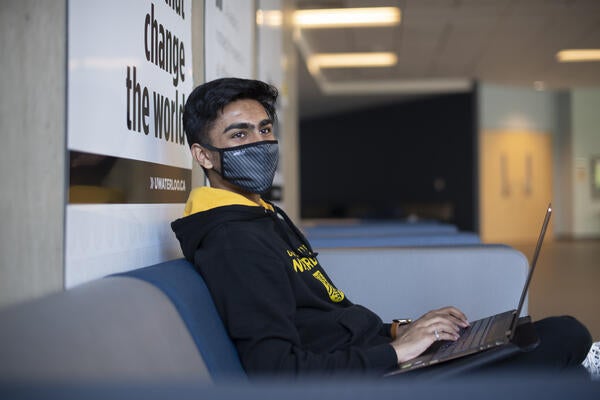
Excelling in an unprecedented time
Waterloo recognizes outstanding employers for their positive impact on co-operative and experiential education

Waterloo recognizes outstanding employers for their positive impact on co-operative and experiential education
By Namish Modi Office of AdvancementFrom facilitating affordable, accessible energy to encouraging students to think beyond their job descriptions, empowering students was a common theme for many employers in 2020. Many employers continue to find new ways to prepare students for a future none of us would have pictured.
Amid the COVID-19 pandemic, work, and the future of work, has changed considerably. Companies saw their workforce, including some co-op students, working from different countries and some moved to fully remote work.
Through immense change, Co-operative and Experiential Education (CEE)’s Employer Impact Award recipients offered Waterloo students unique opportunities to develop their skills. Students are developing technical and human-centric skills that help better prepare them for the workforce.
The second Employer Impact Awards were held virtually on October 7, 2021. Here are this year’s recipients:
Despite a virtual setting, employers and students at the recipient organizations have continued to partner in producing exceptional work.
Polar prioritizes work-life balance for students and staff. Geotab encourages its co-op students to innovate and find solutions in the workplace. Sunnybrook’s Odette Cancer Centre (OCC) facilitates students running their own clinical trials. Waterloo Institute for Sustainable Energy (WISE) provides students with an understanding of the importance of sustainable energy. ASSA ABLOY, which typically offers students an experience working abroad, was able to keep students through the challenge of working remotely from different time zones.
“Congratulations to all of this year’s Employer Impact Award recipients. It’s an honour to work with our global network of employers to create rich, quality learning experiences for students,” says Associate Provost of CEE, Norah McRae. “Collectively, we ensure a strong future economy by enabling our talented students to establish a lifelong learning mindset and develop the most in-demand skills for an increasingly complex future workforce.”
CEE employers provide work-integrated learning opportunities for more than 25,000 co-op students. More than 7,100 employers from 60+ countries come to Waterloo to access student talent from the world’s largest co-op talent pool. The program continues to help students develop skills that make them ready to tackle the workforce.
“Every co-op experience creates a space for our employers to harness the power of students’ enthusiasm, academic knowledge and interest in learning,” says Ross Johnston, executive director of Co-operative Education. “Through such supportive and inclusive co-op experiences, our students find meaning and are enabled to be future-ready.”
The company offers students opportunities to solve important problems and deliver solutions for a diverse global organization.
|
Canada Mortgage and Housing Corporation (CMHC) – Innovation Division Impact in Innovation |
NERv Technology |
Waterloo Institute for Sustainable Energy (WISE) Impact in International Excellence |
|
Rhetoricon Database |
Canadian Wildlife Service Impact in Sustainability |
BlackBerry Impact on Student Experience |

Read more
One year after the start of the pandemic, we spoke with Norah McRae, Associate Provost, Co-operative and Experiential Education (CEE) at the University of Waterloo, to learn how COVID-19 has impacted co-op students, how students found jobs during the pandemic and how the program intends to prepare students for the future of work in a post-pandemic economy.

Read more
New program will offer one-term work projects, with mentorship support from industry partners

Read more
Pharmacy co-op students, employers and staff collaborated to achieve 100 per cent co-op employment for pharmacy students throughout 2020
The University of Waterloo acknowledges that much of our work takes place on the traditional territory of the Neutral, Anishinaabeg, and Haudenosaunee peoples. Our main campus is situated on the Haldimand Tract, the land granted to the Six Nations that includes six miles on each side of the Grand River. Our active work toward reconciliation takes place across our campuses through research, learning, teaching, and community building, and is co-ordinated within the Office of Indigenous Relations.